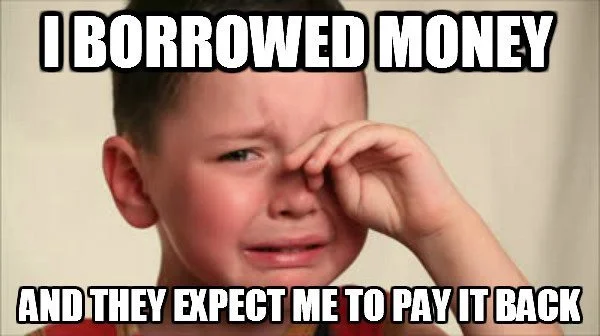Should you crack that egg?
If you are considering buying a house, then it’s a given that you’ve weighed your options on how to pay for it. I mean, unless you’re a bazillionaire and money is no object, in which case you’d simply write that check and let your accountant sort it out later. Chances are if you’re on my website reading this blog post, you’re not a bazillionaire and that’s cool, cuz neither am I.
Well now that we’ve sorted out who’s who, let’s talk about one option in particular for coming up with the funds to buy that house and if you should really use it.
Is using that nest egg a good idea?
If you have a 401K, you may (or may not) know that you can use the money to buy a house and you have a couple of options in how you go about it. You could withdraw the money or you could borrow against it. While both of these options are seemingly harmless, they both have consequences to your 401K’s future and your financial future.
Let’s explore both options, but first….
It’s pertinent to note that before we start, I just need to say that along with not being a bazillionaire, I am also not a financial analyst, counselor or any other type of investment professional, so please do not go tank your 401K and then say that a crazy lady with a Real Estate blog told ya to! Okay? Okay!!
Withdrawal. 🫣…poor piggy
WITHDRAWAL
One option for using money in your 401K for a home purchase would be a withdrawal.
It kinds goes without saying (but I’ll say it anyway) that a withdrawal means you’re actually depleting your 401K by the amount you withdraw. 🤯. I know, right?!!
All joking aside, this does have significant implications to you financially, and to your 401K’s future.
PENALTIES:
If you’re withdrawing before you are age 59.5, you will incur a 10% penalty tax on top of the normal income tax. If you withdraw $25,000 you will pay $2,500 in penalty tax plus the normal income tax. You don’t really think that Uncle Sam is gonna give up his cut do you?
Is there a way to avoid the 10% penalty tax? Yes, you can apply for what is called a “hardship withdrawal” which will waive the 10% penalty tax, but this has to be approved by the plan sponsor and typically the rules for which circumstances are eligible, are set up by your employer. Those circumstances may be things like certain medical expenses, burial or funeral costs, expenses to avoid foreclosure, and even purchasing a principal residence. It’s best to read the fine print of your employers 401K plan or seek guidance from your HR Department if you are looking to go this route. Also remember that a hardship withdrawal is still subject to normal income tax.
FUTURE RETURNS:
Even if you’re able to get approved for a hardship withdrawal and manage to escape the 10% penalty, you will still be diminishing the 401K’s future returns by taking the withdrawal. Why? Because every dollar withdrawn from your 401K is a dollar that misses the opportunity to grow on a tax-deferred basis. For perspective, let’s look at a scenario like this; a 30yr old withdraws just $3000 from their 401K (for whatever reason), which doesn’t feel like a big deal, right? I mean in this lifetime, $3000 doesn’t take long to spend. BUT…and you knew it was coming….BUT if left in the 401K, that money would have been worth $33,000 by the time the investor turns 60. That’s a chunk of change you can’t argue with and obviously the larger the amount of the withdrawal, the larger the amount that will not be growing.
Having said all of the above, it is also worth saying that out of all the reasons one may withdraw money from their 401K, doing so to purchase a primary residence may have the least negative impact. That is because a home does (generally) appreciate in value over time, much like an investment.
401K Loans. It might make you cry…
BORROWING
Why is it that we’re expected to pay back the money we borrow? How rude! I mean, just once it would be nice “to not ta” (in the words of Mater…from Cars). 🤣 Never gonna happen.
The other option for using money from your 401K is to borrow it. Most 401K’s allow you to borrow up to 50% of the money vested, up to a certain amount…usually $50,000…and for a certain amount of time…usually 5 years.
Even though this is the better alternative to withdrawing the funds, it is also not highly recommended.
Just like with most anything, there are Pro’s and Con’s. Let’s break them down here.
The Pro’s:
The loan is tax-free. Because you are not withdrawing the funds, you will not be taxed on them.
The interest rate is relatively low.
You are paying yourself the interest instead of a commercial lender or bank.
You don’t have to apply or worry about approval as with a typical lender
You don’t have to worry about your credit score.
Repayment is automatic because it becomes a payroll deduction.
The Con’s:
Is it really tax-free tho? The funds you are borrowing were contributed on a pre-tax basis, but you are paying it back with after-tax money. Essentially, depending on what tax bracket you fall in, every dollar you earn leaves you with only about 76 cents to make the repayment with because the rest goes to income tax first.
That low interest rate is great, but is it worth the fact that you will be missing out on investment return? Many people may not realize that while you are repaying that loan, you are not allowed to contribute so the balance of the funds you are earning returns on won’t be increasing until the loan is fully repaid.
That automatic repayment thing is a double edge sword really because now your take home pay is reduced by an additional deduction taken right from your paycheck. As if the other deductions we have no choice in aren’t bad enough right?!
What if you lose or leave your job before repayment is fulfilled? This is scary! If you are no longer getting that paycheck with the automatic payment deduction, you will find yourself with a mandated timeframe in which to repay the outstanding balance. Sixty days….about two months…roughly 8 weeks…that’s all the time you have to replay the outstanding balance of this loan 😳😱🫣. Yeah, that hits me in the feels too! If leaving this job is your choice, you may end up having to pass up a different or better opportunity in order to meet this repayment obligation. That would really suck.
As if all of the above points aren’t enough, the last bit of bad news to pass on here is what happens if you ultimately cannot make the repayment within those sixty days? Well, it gets treated as a withdrawal and you’ll end up paying taxes and penalties.
Have a Discussion
THE BOTTOM LINE
There is a lot at stake when it comes to dipping into your 401K so before you make that decision, have an in depth conversation with as many sources as you can. Talk to Human Resources or your Financial Advisor about your plan and be sure you understand all of the fine print and options. Talk to a regular lender, local or non local….and talk to several of them. If you haven’t already, go read my other blog post about lenders. You have so many options when it comes to lenders and what they offer and you do not have to settle for any particular one of them. It’s possible you can find the right type of help for obtaining a mortgage without dipping in to that 401K.




